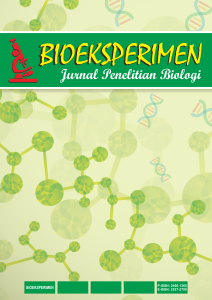Microbiological Quality of Packaged Tea Beverages Using the 3M Petrifilm Rapid E. coli/Coliform Count Plate
DOI:
https://doi.org/10.23917/bioeksperimen.v11i1.9603Keywords:
Coliform, E.coli, Packaged Tea Drinks, 3M Petrifilm Rapid E. coli/Coliform Count PlateAbstract
Tea is a complementary drink which is currently being served in variety ways and can be found in many places. The form of packaging is also very diverse. Glass bottles, plastic bottles, metal cans, paper cups, and plastic cups are just few of the many different forms of packaging that are available. The Indonesian National Standards Agency has established several requirements that bottled drinking water must fulfill in order to be legally sold in the country; one of these requirements is that it cannot contain any bacteria that could potentially cause disease. However, the reality is that within the community there are still packaged drinks that are not safe for human consumption. This study tested the quality of bottled tea supplied in a university canteen using 10 brands in varying packaging. 3M Petrifilm Rapid E. coli/Coliform Count Plate is utilized. The test results showed that 10 brands of tea packaging that were sold negatively did not contain E.coli and Coliform, which could be seen by the lack of gas bubbles and discoloration on the petrifilm media. This means that all packaged beverage samples sold are safe to drink.
Downloads
References
Ariefiansyah, M. N., Suharti, N., & Anas, E. (2015). Identifikasi Bakteri Coliform yang Terdapat pada Minuman Es Teh di Rumah Makan Tepi Laut Purus Padang Barat. Jurnal Kesehatan Andalas, 4(3), 777–780. https://doi.org/10.25077/jka.v4i3.363
Badan Standardisasi Nasional. (2009). SNI 7388:2009 Batas maksimum cemaran mikroba dalam pangan. Standar Nasional Indonesia, 17.
Barreira, M. J., Marcos, S., Flores, C. V., Lopes, T. T., Moura, I. B., Correia, C. B., Saraiva, M., & Batista, R. (2024). Microbiological quality of ready-to-eat street foods in Lisbon, Portugal. Discover Food, 4(1). https://doi.org/10.1007/s44187-024-00105-8
Bird, P., Bastin, B., Klass, N., Crowley, E., Agin, J., Goins, D., Bakken, H., Lingle, C., & Schumacher, A. (2021). Evaluation of the 3MTM PetrifilmTM Rapid E. coli/ Coliform Count Plate for the Enumeration of E. coli and Coliforms: Collaborative Study, First Action: 2018.13. Journal of AOAC International, 103(2), 513–522. https://doi.org/10.1093/JAOCINT/QSZ013
Biva, N. A., Ismail, I., Azad, F., Rifat, M. A., & Alim, S. R. (2019). Microbiological quality of some common dairy beverages available in Dhaka University campus of Bangladesh. Cogent Food and Agriculture, 5(1). https://doi.org/10.1080/23311932.2019.1707054
de Souza, L. M. J., Costa, A. C., Nero, L. A., Couto, E. P., & Ferreira, M. de A. (2015). Evaluation of PetrifilmTM system compared with traditional methodology in count of indicators of sanitary-hygienic quality and pathogenic microorganisms in sheep milk. Food Science and Technology (Brazil), 35(2), 375–379. https://doi.org/10.1590/1678-457X.6430
Doria, M. F. (2006). Bottled water versus tap water: Understanding consumer’s preferences. Journal of Water and Health, 4(2), 271–276. https://doi.org/10.2166/wh.2006.008
Handayani, F., Sundu, R., & Dawia, D. (2017). Identifikasi Bakteri Escherichia Coli Pada Minuman Teh Kemasan Industri Rumah Tangga Di Kelurahan Sungai Dama Dan Selili Menggunakan Metode Most Probable Number (MPN). Jurnal Ilmiah Manuntung, 3(1), 59. https://doi.org/10.51352/jim.v3i1.91
Herdiana, W. (2014). Kajian Bentukan Fisik Kemasan Minuman Teh Siap Saji. Jurnal Ilmiah Sosial Dan Humaniora, 8(1), 18–28.
Hesti; Muzakkar, M. Z. H. (2016). Analisis Kandungan Zat Pengawet Natrium Benzoat Pada Sirup Kemasan Botol Yang Diperdagangkan Di Mall Mandonga Dan Hypermart Lippo Plaza. Jurnal Sains Dan Teknologi Pangan, 1(1), 51–57.
Indrasti, D., & Siliyya, F. (2022). Atribut Minuman Teh Kemasan Siap Minum yang Memengaruhi Persepsi Konsumen di Kabupaten Tegal. Jurnal Mutu Pangan : Indonesian Journal of Food Quality, 8(2), 70–79. https://doi.org/10.29244/jmpi.2021.8.2.70
Khan, M. M., Islam, M. T., Chowdhury, M. M. H., & Alim, S. R. (2015). Assessment of microbiological quality of some drinks sold in the streets of Dhaka university campus in Bangladesh. International Journal of Food Contamination, 2(1). https://doi.org/10.1186/s40550-015-0010-6
Khurniyati, M. I., Estiasih, T., Korespondensi, P., Beauty, R., Beauty, R., & Beauty, R. (2015). Effect of Concentration Sodium Benzoate and Pasteurization ( Temperature and Time ) on Characterist. Jurnal Pangan Dan Agroindustri, 3(2), 523–529.
Laily, N. F., Nurhayati, N., Kusdiyantini, E., Arina, D., & Lunggani, T. (2022). Peningkatan kualitas air Waduk Diponegoro Semarang dengan filter arang aktif. Jurnal Penelitian Saintek, 1(1), 12–23. https://journal.uny.ac.id/index.php/saintek/article/view/48195
Mengistu, D. A., Belami, D. D., Tefera, A. A., & Alemeshet Asefa, Y. (2022). Bacteriological Quality and Public Health Risk of Ready-to-Eat Foods in Developing Countries: Systematic Review and Meta Analysis. Microbiology Insights, 15, 117863612211139. https://doi.org/10.1177/11786361221113916
Nisa, A. S., Hastuti, U. S., & Witjoro, A. (2012). Analisis Mikrobiologi Minuman Teh Seduhan Berbeda Merk Berdasarkan Nilai MPN Coliform di Kota Malang. Biologi, Sains, Lingkungan, Dan Pembelajarannya Dalam Upaya Peningkatan Daya Saing Bangsa, 518–523.
Nuryanti, B. L., & Rahman, A. Y. (2008). Pengaruh Variasi Dan Kemasan Produk Terhadap Keputusan Pembelian Teh Kotak Ultrajaya (Survei pada Mahasiswa FPIPS Universitas Pendidikan Indonesia). Strategic : Jurnal Pendidikan Manajemen Bisnis, 8(2), 31. https://doi.org/10.17509/strategic.v8i2.1022
Pan, S. Y., Nie, Q., Tai, H. C., Song, X. L., Tong, Y. F., Zhang, L. J. F., Wu, X. W., Lin, Z. H., Zhang, Y. Y., Ye, D. Y., Zhang, Y., Wang, X. Y., Zhu, P. L., Chu, Z. S., Yu, Z. L., & Liang, C. (2022). Tea and tea drinking: China’s outstanding contributions to the mankind. Chinese Medicine (United Kingdom), 17(1), 1–40. https://doi.org/10.1186/s13020-022-00571-1
Stanojevic, D., Comic, L., Stefanovic, O., & Solujic-Sukdolak, S. (2009). Antimicrobial effects of sodium benzoate, sodium nitrite and potassium sorbate and their synergistic action in vitro. Bulgarian Journal of Agricultural Science, 15(4), 307–311.
Valavanidis, A. (2019). Tea, the most popular beverage worldwide, is beneficial to human health. Studies on antioxidant polyphenolic constituents and epidemiological evidence for disease prevention. Scientific Reviews, 3(6)(June), 1–35.
Ward, L. A., Cain, O. L., Mullally, R. A., Holliday, K. S., Wernham, A. G., Baillie, P. D., & Greenfield, S. M. (2009). Health beliefs about bottled water: A qualitative study. BMC Public Health, 9, 1–9. https://doi.org/10.1186/1471-2458-9-196.
Downloads
Submitted
Accepted
Published
Issue
Section
License
Copyright (c) 2025 Bioeksperimen: Jurnal Penelitian Biologi

This work is licensed under a Creative Commons Attribution-NonCommercial 4.0 International License.












